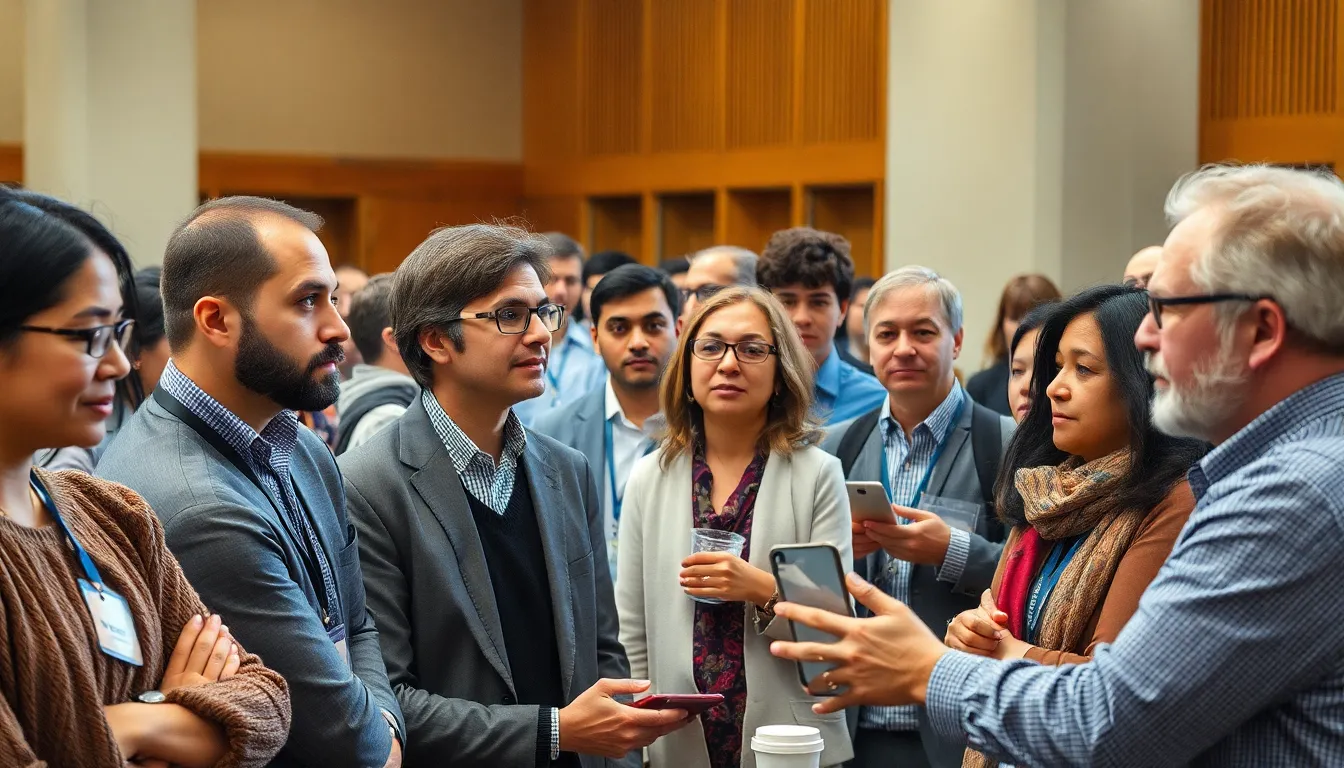Table of Contents
ToggleIn a world buzzing with tweets and TikToks, the art of intellectual discourse might seem as outdated as dial-up internet. Yet, it’s more crucial than ever. Intellectual opinions shape our understanding of complex issues, challenge the status quo, and sometimes, just sometimes, lead to a heated debate over who makes the best pizza. Spoiler alert: it’s always New York.
Engaging with diverse perspectives not only sharpens the mind but also adds a sprinkle of spice to everyday conversations. Whether it’s pondering the mysteries of the universe or debating the merits of pineapple on pizza, intellectual opinions invite us to think deeper and laugh harder. So buckle up as we dive into the delightful chaos of ideas and opinions that keep our brains buzzing and our spirits high.
Understanding Intellectual Opinions
Intellectual opinions shape discourse and reflect deeper insights into various topics. Engaging with these opinions fosters critical thinking and enhances understanding.
Definition and Importance
Intellectual opinions represent well-reasoned viewpoints grounded in evidence. They serve as a foundation for discussions about complex issues, promoting healthy debate. Engaging with diverse intellectual opinions encourages exploration of multifaceted perspectives. Such exploration enhances one’s ability to analyze information critically. Intellectual opinions foster a richer understanding of societal challenges and inspire informed action. In a world filled with noise, these opinions help clarify important discussions, ensuring that dialogue remains substantive and impactful.
Characteristics of Intellectual Opinions
Intellectual opinions exhibit clarity and logical reasoning. They rely on evidence, making claims supported by facts and research. Diverse viewpoints illuminate different aspects of a topic, enriching discussion. Active engagement often characterizes these opinions, reflecting an ongoing dialogue. Respect for opposing views enhances understanding and promotes open-mindedness. Intellectual opinions also evolve over time as new information emerges. This adaptability shows a commitment to learning, which remains essential in any substantive conversation.
Different Sources of Intellectual Opinions

Engaging with various sources of intellectual opinions enriches understanding and fosters stimulating discussions. Significant sources include academia, research institutions, and media outlets that shape public discourse.
Academia and Research
Academic institutions generate critical intellectual opinions through rigorous research and scholarly debate. Experts in different fields publish findings in peer-reviewed journals, providing well-supported perspectives on complex topics. Universities often host symposiums and panels, bringing together scholars to discuss emerging ideas and challenge existing paradigms. Researchers contribute to societal understanding by delving deep into subjects, ensuring that opinions remain grounded in empirical evidence. This focus on evidence-based conclusions promotes clarity and logical reasoning among audiences.
Media and Public Discourse
Media serves as a powerful platform for the exchange of intellectual opinions. News organizations, blogs, and podcasts offer diverse viewpoints, shaping public perception on various issues. Thought leaders and columnists provide commentary, exposing audiences to informed perspectives that may differ from mainstream narratives. Engagement through social media further amplifies this discourse, allowing individuals to share insights and debate ideas in real-time. Alternative media outlets often challenge traditional narratives, fostering broader discussions on complex societal challenges.
The Impact of Intellectual Opinions
Intellectual opinions play a crucial role in shaping society. They influence various domains, from public policy to social movements.
Shaping Public Policy
Well-reasoned intellectual opinions inform lawmakers and public officials about complex issues. These opinions often expose gaps in legislation, prompting elected officials to re-evaluate their positions. Research conducted by think tanks provides critical insights that promote evidence-based decision-making. Academic studies contribute to discussions, ensuring policies address real-world challenges. Through advocacy, intellectuals can mobilize support for significant reforms. Historical examples demonstrate how influential thinkers have shifted government priorities towards social equity, environmental protection, and public health. Engaging in discourse surrounding these opinions encourages transparency and accountability within governance.
Influencing Social Movements
Intellectual opinions also spark and sustain social movements. By articulating grievances and offering solutions, they galvanize public support. Influential figures in academia, journalism, and grassroots organizations amplify voices calling for change. Movements like civil rights and climate action owe their momentum to well-formulated arguments and evidence-based strategies. Thoughtful critiques of societal norms inspire individuals to reassess their values and actions. Media platforms amplify these discussions, creating awareness and mobilizing communities. The interplay of diverse perspectives strengthens movements, promoting inclusivity and resilience through shared objectives. Engaging with these opinions fosters unity and empowerment among advocates.
Challenges in Expressing Intellectual Opinions
Expressing intellectual opinions comes with various challenges that can hinder open dialogue and productive debate. Significant obstacles arise from censorship and the role of social media.
Censorship and Freedom of Speech
Censorship poses a major barrier to the expression of intellectual opinions. Many individuals encounter restrictions that limit the sharing of controversial ideas. This suppression often occurs in environments where prevailing norms discourage dissenting voices. Freedom of speech is essential for fostering meaningful discourse, yet various platforms enforce guidelines that can stifle diverse perspectives. Academic institutions and media outlets sometimes hesitate to publish certain viewpoints due to fear of backlash. Ensuring open dialogue necessitates safeguarding the right to express differing opinions without fear of reprisal.
The Role of Social Media
Social media plays a crucial role in shaping intellectual discourse today. Various platforms allow users to share thoughts and engage in discussions that can reach vast audiences. Information spreads quickly, sometimes blurring the lines between credible insights and misinformation. Consequently, individuals may struggle to articulate well-reasoned opinions amidst the noise of competing narratives. Algorithms often amplify sensational content, overshadowing thoughtful dialogue. Engaging meaningfully on social media requires discernment and the willingness to navigate complex conversations. Balancing diverse viewpoints can enrich discussions, but it also necessitates vigilance against polarization and echo chambers.
Intellectual opinions play a crucial role in shaping meaningful discourse and fostering a deeper understanding of complex issues. By engaging with diverse viewpoints individuals can enhance their critical thinking and contribute to more enriching discussions. This exchange of ideas not only influences public policy but also fuels social movements that drive change.
As society navigates the challenges of the digital age it’s essential to prioritize open-mindedness and respect for differing opinions. This commitment to intellectual engagement promotes a culture of thoughtful dialogue that can withstand the noise and distractions of modern communication. Ultimately the pursuit of well-reasoned opinions is vital for cultivating informed communities ready to tackle the pressing issues of today.










